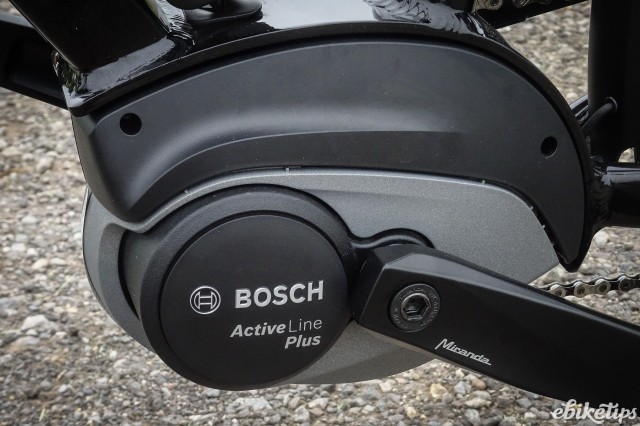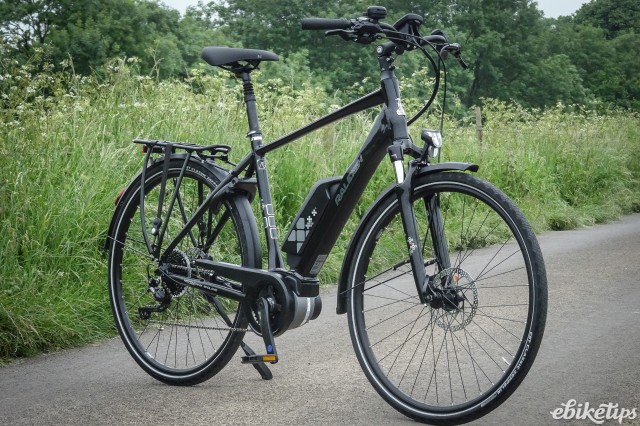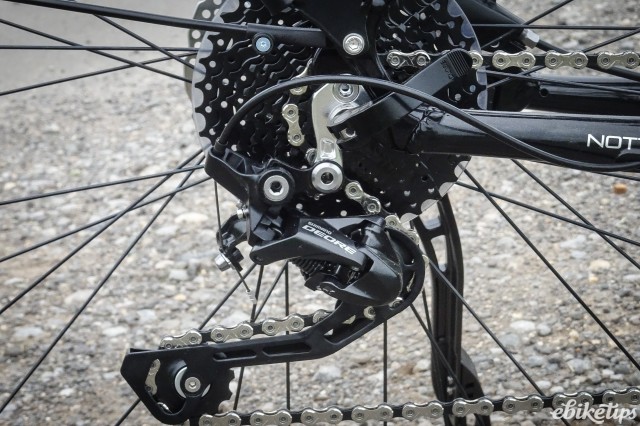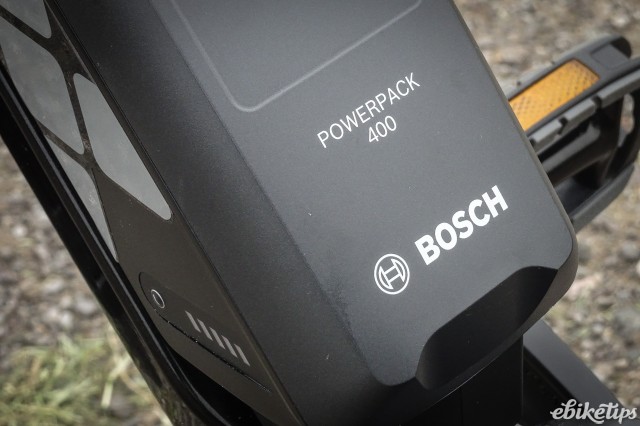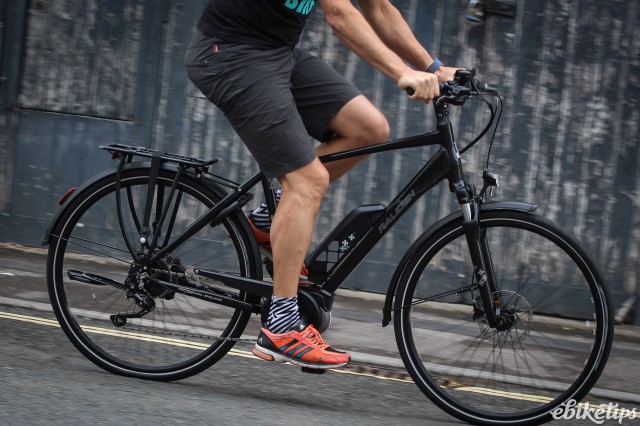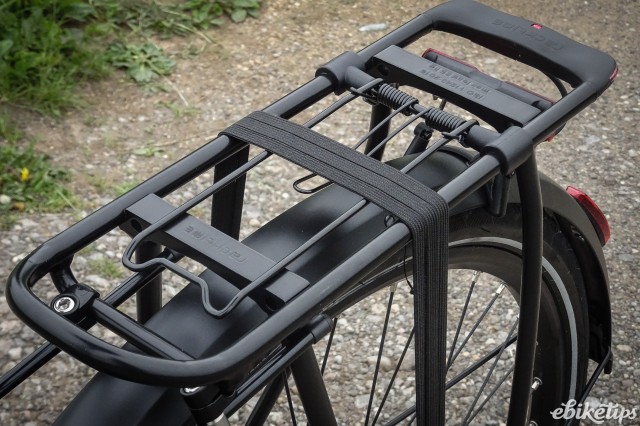Raleigh Motus Grand Tour
ebiketips
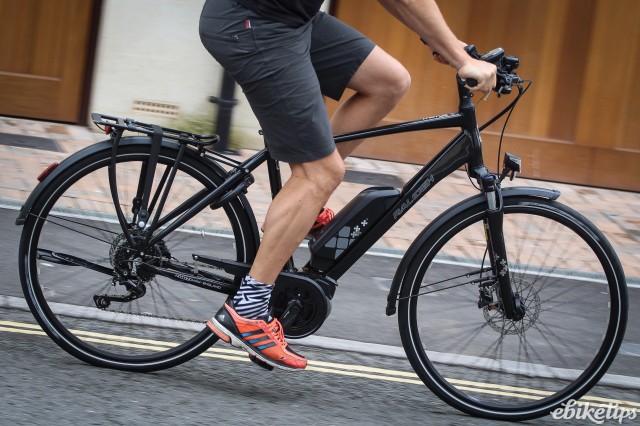
If you’re looking for a dependable and well-specced city e-bike that you’re going to use all the time, then around the £2,000 mark is where you’ll find a lot of choice. It’s a big enough budget to get a good mid-motor and very solid transmission and finishing components. The Raleigh Motus Grand Tour is a fine example of a great quality workhorse: The new Bosch Active Line Plus motor is a big improvement over the previous version, and the high-quality build will keep you rolling for years to come. It’s a really nice bike and one that I’d recommend.
The Motus Grand Tour is available with either a diamond frame or as a low-step. I had the diamond frame on test, although if it was my choice I’d go for a low-step every time: they’re just easier to get on and off around town, and you don’t really need the extra stiffness the crossbar provides on a bike like this. I didn’t have any issues with the diamond frame though: the geometry is sensible, with a riding position that’s upright without feeling too pedestrian. It’s nicely built and finished, with a subtle metallic fleck in the black paint job: it’s a nice looking bike.
The motor: new Active Line is a big improvement
This is the first bike I’ve had with the new Bosch Active Line Plus motor. Bosch has moved from an internally geared system – where the pedals indirectly drive a small drive ring – to a fixed axle, where the pedals and the chainring are both driven at the same speed. Active Line is now a two-motor range, with the Plus version, with 50Nm of torque, a bit more powerful than the standard version, with 40Nm. Physically the motor is a bit smaller and lighter than the previous incarnation. It offers up to 270% assistance in turbo mode.
The first thing you notice is how quiet the new Active Line Plus motor is. Bosch motors have historically been fairly noisy, especially in the higher assistance modes. In marked contrast, this new motor is functionally silent a lot of the time: the noise it makes is no louder than the sound from the tyres or the drivetrain. If you ramp the power all the way up to Turbo then you can hear it helping you along, but it’s nowhere near as loud as the previous Active Line motor. It’s a huge improvement.
The feel of the motor has changed a bit. The way the Active Line Plus motor delivers its power is a bit more natural, and overall it’s a bit closer to the feel of the Brose system, especially in the lower modes. Possibly the lack of noise is part of that, but it certainly feels a bit more responsive to your input.
In terms of power, there’s plenty. The Motus made my benchmark climb on my commute (1.5km at 5%, with a 12% section) trivially easy, and the 10-speed Shimano Deore gearing on the bike gives an excellent spread of gears for the ups and downs. To test the limits of the motor I pointed it at some of Bath’s more challenging hills; it was very happy up to about a 15% incline, and only really struggled above 20%. So there’s plenty in the tank for pretty much anything you’re likely to encounter.
The Motus comes with Bosch’s clear and simple Intuvia display, and a 400Wh frame-mounted battery. Raleigh’s claim that you’ll get up to 110 miles out of the bike is – how shall I put this – optimistic. On a bike like this, with a battery that big, I’d expect to be able to knock out 40-60 miles on flatter terrain without any range anxiety. Whatever your commute, that’s likely to be enough. Once things get hillier, the range will drop: on my commute, which is just down a big hill at the start of the day and back up it at home time, I didn’t get much more than 20 miles out of the Motus. That’s in line with similar bikes, and it’s four days between charges, so it’s not an issue. One thing to note is that the Raleigh comes with Bosch’s compact charger, which isn’t as quick to charge the bike. You really need to do it overnight, or over the course of a full day at work.
The ride: you’re comfortable and in control
The Motus Grand Tour is a very easy bike to ride: the position is correct for city and leisure riding and the swept bars are comfortable and give you good control. The Shimano hydraulic disc brakes are excellent, offering masses of predictable stopping power in all conditions. I’ve already touched on the Shimano Deore gearing: it worked faultlessly through the testing period, and the RapidFire shift lever is easy to use and very tactile.
Like most city e-bikes, the Motus gets a suspension fork. Normally I’d have a moan at this point but the Suntour NEX fork is pretty chunky and better than most in terms of its performance and its stiffness. It also has a lockout lever if you don’t want a bouncy front end. The CST Zeppelin 42mm tyres are decent enough, with a firm ride feel and reflective sidewalls for a bit of extra visibility after dark. The suspension seatpost wasn’t a highlight; It was sticky and poorly-damped, and the action was a bit on-off for my liking. The bike would be better without it. Or with a better one.
At the back you get a Racktime rear carrier, and the rear light is integrated into this. It’s not the brightest rear light, but it’s neat. The Trelock front light has a German-style road beam that directs all the light at the road surface. It’s plenty for being seen about town and enough for slowish progress along unlit lanes too.
Overall: well specced, good to ride
The Motus Grand Tour is a solid buy for the £2,150 asking price. The Motus range starts at about £500 less but if you’re serious about using an e-bike as your full-time transport then the component upgrades and the more powerful motor are worth the extra spend. I haven’t ridden the other two bikes in the range, but given that they share a common frame design and all of them get a decent lockout fork, I’d say that they’re likely to be good options too if your budget doesn’t stretch this far.
Ralegh Motus Grand Tour specs
| Frame | Alloy Crossbar frame AL6061 |
| Approximate Weight | Derailleur = 24.5kg Hub = 25.5kg |
| Suspension Fork | Suntour Nex suspension fork 63mm travel |
| Headset | Low Stack semi integrated |
| Shift Levers | Deore 10 speed |
| Left Shift Lever | Bosch Intuvia Controller |
| Brake Levers | Shimano M315 Hydraulic Disc brake |
| Rear Derailleur | Deore 10 speed |
| Cassette | Sunrace 10 speed 11-34 cassette |
| Chain | KMC 10 speed |
| Pedals | Comfort Pedals with Anti Slip |
| Rims | Black 36 hole disc brake compatible |
| Tyres | CST ZEPPELIN 700C X 42 with reflective stripe & puncture protection |
| Stem | Adjustable angle Alloy |
| Handlebars | Comfort XLC Handlebar Black |
| Grips | Comfort Grip |
| Saddle | Selle Royal Scienta R2 |
| Seatpost | Alloy Suspension Seatpost 30.9 |
| Seat Clamp | 34.9 mm Quick Release Alloy Clamp |
| Mudguards | SKS Full Mudguards |
| Rear Carrier | Racktime Alloy rack with integrated light |
| Crankset | Raleigh Alloy BOSCH crank set |
| Bottom Bracket | Bosch Integrated in motor |
| Front Hub | Alloy 36 hole black disc QR |
| Rear Hub | Alloy cassette Hub 36 hole disc QR |
| Inner Tubes | 700x38c presta |
| Extras | Kick Stand, Charger |
| Front Wheel | Alloy Double wall, 36 spoke, 700c on Alloy disc hub |
| Rear Wheel | Double Wall rim 36 hole 700c on alloy disc hub |
| Rear Derailleur Dropout | Alloy Replaceable Hanger |
| Front Brake | Shimano M315 hydraulic disc brake |
| Rear Brake | Shimano M315 hydraulic disc brake |
| Motor | Bosch Active Line plus |
| Battery | Bosch Power Pack Frame Mount 400Wh, 36V |
| Display | Bosch Intuvia multifunctional display with operation unit & push-assistance |
| Display Bracket | Bosch Intuvia Display holder |
| Sensor | Bosch Speed Sensor |
| Wiring Loom | Cable frame Battery 310MM |
| Lighting | Trelock front and rear lights |
